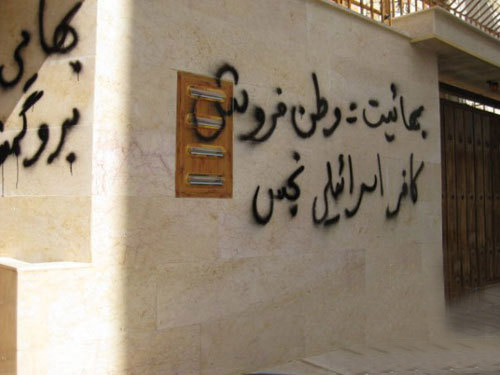
 [frontline, tehran bureau, 14 Sep. 2012]
[frontline, tehran bureau, 14 Sep. 2012]
[ opinion ] Later this month, the United Nations will host Mahmoud Ahmadinejad for his final annual visit as president of Iran. His ineligibility for reelection next year due to a term limit means that he will not return in September 2013. His government’s nuclear ambitions have so dominated recent discussion about his country that it has been possible, at times, to overlook how abysmal its human rights record has been. Having grown up with the indignities of the apartheid system in South Africa, I bristle whenever I hear anyone equate a government’s treatment of a portion of its citizenry to apartheid. Usually, the claims are exaggerated. But in Iran today, the government’s treatment of the Baha’i community bears striking similarities.
Baha’is are the largest non-Muslim religious minority in Iran. Although the community’s central tenets involve the promotion of peace, the acceptance of the divine origin of all of the great religions of the world, and the unity of humankind, its members are harassed and persecuted by the government and accused of being spies. The Baha’is have suffered persecution since the founding of the religion in Iran in the mid-1800s. After the Islamic Revolution in 1979, repression and discrimination intensified. The regime has established a set of restrictions on Baha’is that are surprisingly reminiscent of the apartheid system.
In apartheid South Africa, blacks were prohibited under the Constitution Act, No. 32 of 1961 from being legislators. In Iran, Baha’is are constitutionally excluded from service in the parliament. By contrast, Christians, Zoroastrians, and Jews hold one or two seats each as part of their status as constitutionally recognized religious minorities.
In apartheid South Africa, Section 32 of the Extension of University Education Act, No. 45 of 1959 prohibited “non-white” students from registering at and attending “white universities.” In Iran, a confidential memorandum (the “Golpaygani Memorandum”) dated February 25, 1991, from the secretary of the Supreme Revolutionary Cultural Council, Seyyed Mohammad Golpaygani, and signed by the Supreme Leader, Ali Khamenei, provided that Baha’is “must be expelled from universities, either in the admission process or during the course of their studies, once it becomes known that they are Baha’is.”
Since then, Baha’is have relied on their own human and financial resources to create an informal tertiary system of education known as the Baha’i Institute for Higher Education (BIHE). Unwilling to accept even separate education, the government has several times raided homes where classes are held, most recently in May 2011, confiscating books and computers, arresting educators, and shortly thereafter outlawing BIHE activities. Declaring the provision of education to Baha’is to be illegal is reminiscent of the Bantu Education Act, No. 47 of 1953, which made it a crime to conduct a school or class for blacks without official permission.
In apartheid South Africa, Section 77 of the Industrial Conciliation Act, No. 28 of 1956 empowered the minister of labor to make determinations reserving certain occupations to a particular racial group and 1957’s Proclamation No. 329, issued under the Group Areas Act, No. 41 of 1950, prohibited any black person from being employed as an “executive, professional, technical or administrative employee, manager or supervisor” in a business in a white area.
Similar measures exist to subordinate the Baha’i community. A provision in the Golpaygani Memorandum specifies that their livelihoods should be limited to “modest” ones and that their “progress and development” should be “blocked.” Evidence of this provision at work is contained in a letter dated April 9, 2007, from the Public Places Supervision Office of the Public Intelligence and Security Force in the province of Tehran. It is addressed to the regional commanders of police and the heads of public intelligence and security forces and instructs them to prevent Baha’is from engaging in a wide range of businesses including “high-earning businesses” and from receiving permits in 25 “sensitive business categories” and trades ranging from the tourist industry to computer sales, publishing, and a wide range of food businesses. In the town of Semnan, for example, the government has shut down at least 17 Baha’i-owned small businesses in the last three years.
Massive confiscations of property and forced removals of black communities took place in South Africa during the apartheid era. In documented cases since 1979, there have been over 2,000 houses, apartments, offices, shops, factories, farms, and pieces of land confiscated from Baha’is. Over 200 Baha’is have been executed since 1979, many of them tortured by the government in attempts to force them to recant their beliefs. Many South African blacks were executed, imprisoned, and tortured for their political activities in pursuit of an end to the apartheid system.
Admittedly, there are areas of difference. Baha’is have generally not been segregated from other Iranians residentially or for primary and secondary education. Also, since they are physically indistinguishable from the rest of the population, they have generally not been subject to the “petty” apartheid — segregation in public places — that governed life in South Africa. Nevertheless, they, like black South Africans during the apartheid period, are subject to a series of legal and administrative restrictions designed to subordinate and marginalize them. The Iranian government expects Baha’is, historically among the best educated communities in Iran, to eke out a meager existence as a separate underclass that will eventually disappear.
It is disturbing that the international expression of concern over this situation has not risen to a higher pitch, as the global community, including, hypocritically, the Iranian government, has long agreed that apartheid and comparable systems are a clear outrage on human dignity. Indeed, the Baha’is espouse values that are the direct opposite of the apartheid-like values of the government. Despite the attention drawn to the threat posed by Iran’s nuclear ambitions, we cannot forget what Iran is doing to its own people. At 116, the number of Baha’is currently in prison is the highest in about two decades — a strong indicator of the condition of human rights in the society at large, which includes the persecution not only of political opponents and religious minorities, but also of trade unionists, artists, journalists, lawyers, and advocates of the rights of women. If left unchecked, the values and practices of the Iranian government could contribute to a global contagion of abuse. They represent a threat not only to the Baha’is and the people of Iran, but also to the dignity of all people. Mr. Ahmadinejad must be confronted with this during his final U.N. visit.
Copyright © 2012 Tehran Bureau
—
Source: Read more: http://www.pbs.org/wgbh/pages/frontline/tehranbureau/2012/09/opinion-irans-neo-apartheid-rampant-persecution-of-bahais-in-cradle-of-faith.html#ixzz26mERDBPx
September 18, 2012 12:00 pm
Justice should be brought at all cost.prejudice should be eliminated.the doers of injustice must pay for it.
September 18, 2012 4:34 pm
The Islamic Republic of Iran (IRI) should technically be banned from membership in the United Nations for their abysmal record. Lets not forget that there are quiet a few other countries that respect IRI policies and follow in their example in abusing their citizens. For many of these countries Ignorance is the absolute norm, and Human Rights does not exist in their vocabulary.
September 19, 2012 12:28 am
I feel so badly of the African losses and the abuses of the Baha’is by the Islamic republic of Iran. there just hast to be a better way for our world to learn how to live—without persecuting anyone for their race, nationality, culture or religion. In a particularly powerful passage from Baha’u’llah the Founder of the Baha’i Faith wrote in “The Hidden Words” He called for the world to shun bigotry and persecution: He wrote “O OPPRESSORS OF EARTH! Withdraw your hands from tyranny, for I have pledged Myself not to forgive any man’s injustice. This is My covenant which I have irrevocably decreed in the preserved tablet and sealed it with My seal of glory.” and “My forbearance hath emboldened you and My long-suffering hath made you negligent, in such wise that ye have spurred on the fiery charger of passion into perilous ways that lead unto destruction. Have ye thought Me heedless or that I was unaware?” I just continue to pray daily that all peoples unfairly treated will soon be fre